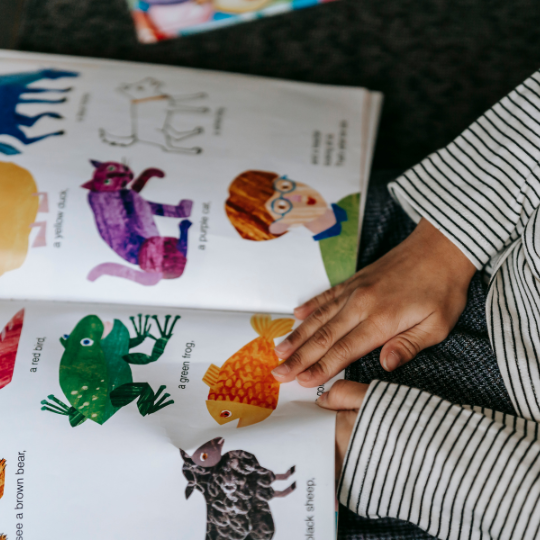

A true story about why we do what we do, and the power of music and process to transform ourselves, our ensembles and our audiences.

If Peter & the Wolf and Young Person's Guide are feeling a bit stale, spice up your children's programming with these delightful modern works for young audiences by living composers.

Keep your audience on their toes - or not. They'll be hard pressed to keep tapping in time to these off-balance marches!

Looking to diversify the repertoire for your orchestra? Whether your musicians are just starting out, or ready for a big challenge, there's a work by an Australian composer with your name on it!

Why do I shudder when people use the word ‘talented’ to describe me? Why would I ask journalists and marketers to remove it from articles about me? Though it might seem like praise, the word ‘talent’ actually holds us and our people back.

Our past needn't dictate our future. Success is the product of persistence, sustained effort and being willing to change.

How can we get our ensemble members to better connect rhythm with a consistent beat or subdivision AND to become aware of when they're out of sync?

Well, does it? If the answer's no, then we've got work to do. Here's how to get better.

An edited extract from my new book Planning Effective Rehearsals: Tools to Boost Learning & Engagement

A simple approach to instantly approach every piece with more musicianship, storytelling and emotion - for us, and our ensembles!
.png)
Being told to play louder or softer is okay. Being told why is better.

Here are 6 incredible band works for ensembles from Grade 1-5 you need to hear, program and perform - that just happen to be by women composers.

The path to musical nirvana starts with a single question. And the path to musical hell starts with telling the ensemble what to do.

Want to go from being a human metronome to embodying all the emotions in the music? We need to know the music, and know ourselves.

We all know that expressive performances are way more engaging, satisfying and interesting for all involved. So why do we often get stuck grinding through notes, leading performances that barely get the dots across? What can we do about it?

Going back to in person rehearsals? Congratulations! Excited? Scared? Me too! Here's how to manage yourself and mentally prepare for going back, without burning out

Going back to in person rehearsals? Congratulations! Here's how to plan for success, manage challenges and be realistic in your expectations.

Going back to in person rehearsals? Congratulations! Here's what to expect from your musicians and how you can help them get back in the groove.

Going back to in person rehearsals? Congratulations! Here's what to expect when you drop the stick on that first rehearsal, and how to make it sound better

Could two questions really shift the experience of your ensemble and boost their learning dramatically? You betcha.
.png)
Learn a simple 5-minute habit that will drastically improve the productivity and planning of your rehearsals, whether you're super-prepared or haven't thought about the group and the music since your last rehearsal.

There is one word that immediately creates division, disconnection and a power imbalance within our ensembles. And we use it so often on the podium, we often have no awareness we're saying it.

Outward success isn't always what it seems. Feeling left behind while others thrive? Chances are, they're feeling the same way.

Feel like you spend too much time working on the easy stuff, at the expense of mastering the more challenging parts of your repertoire? This simple formula helps you allocate rehearsal time easily and effectively so you don't get caught out.

My cautionary tale of a hearing scare, and what you can do to preserve and protect your hearing.

Wherever you are, however short your break, these 5 tips will help you recharge, reconnect and revive.
.png)
Finding gratitude in uncertainty. Letting go of expectations. Learning how to 'begin again' when life throws you a year like no other. What I've learned launching a conducting business in a year when conducting as we knew it ceased to exist.
.png)
Why and how does change happen? How do we innovate, lead, experiment and grow to create a better future? What compels us to remain stuck, fixed, unyielding?
.png)
Improve your conducting while sitting in the ensemble as a player or singer? You bet you can! Here's how...

Help your students prepare healthily and thoughtfully for auditions so they'll get (and recognise) the benefits long after the results are posted.
.png)
We have an essential and urgent responsibility to model and teach critical thinking through our ensembles. Now.

Now is the time to rewrite the rule book of how we utilise that most precious resource: rehearsal time!

How do we keep aspiring to be great teachers and conductors when the rug has been pulled out from under us? How do we keep striving for excellence without beating ourselves up in the process?

In a world where rehearsals are online, performances are on hold and the future is uncertain, what are our ensembles for?

The vast majority of our musical training is spent in pursuit of an impossible perfection. Deluged by the demands of technique, we forget the entire purpose of our art is to connect. To move people. To change people.
.jpg)
If, one year from now, you were to give yourself an 'A' grade for how you showed up in life as a person, partner, conductor, teacher - who would you have become to earn it?

How one conducting lesson helped me see and unravel what had been holding me back, not only as a conductor, but as a person.
.png)
What happens when you decide to ask a life-long hero for a conducting lesson on Zoom during a pandemic? Here's the story of how I met Benjamin Zander...

3 student activities and 5 teacher PD questions from my interview with Steven Bryant

Including 5 activities for conductors and students on being in the moment, being more expressive using acting and reflecting on competition.

Even though we're not playing together, we can still practice listening for who has the melody in our ensemble music. Plus, how to turn this into a 5-minute score study activity.

Students #stuckathome without instruments? There are still plenty of ways they can practice and improve their skills! PLUS you can use these in rehearsal when everyone's ears need a break.

Every single day we guide musicians in how to respond to the unexpected. From a wrong note, to a glitch on the podium, to a global pandemic.

If we thought of our ensembles as plants, we might find it a lot easier to tend to their needs and understand our responsibilities.

Spinning your wheels because you're still in holiday mode? Frantic because you have an important performance soon? Learn three strategies to replace short term thinking with long range development that will make your ensemble better.

Do you have a bad conducting habit that's been annoying you for a long time? That thing that you remember once for 3 seconds when you're on the podium, then then next time you think of it is an hour later? Here's how to solve that problem, for good.

What does every conductor wants under their tree this year? Whether someone's buying for you, or you're buying for yourself, here are my top picks for last minute conductor gifts to suit every budget.

It's that time of year. We're racing to the finish line, polishing off our holiday concerts, pressing submit on reports, maybe jumping on a plane to Midwest. And let's face it, we're exhausted. We need to recharge our batteries, both musically and personally. Here are four ways you can reconnect to yourself and to great music during the holidays, to get inspired and excited for the year ahead.

It can be hard to know what to say when it doesn't sound good, and you don't want to crush the musicians. The worst thing we can do is say it's good when it isn't.

Sometimes things just don't go according to plan. We can write the best lesson objectives, have the highest hopes and the most open heart and it can still fall to pieces. Those days when nothing is working. Suddenly it's like the last five rehearsals didn't happen and you're back to square one. The musicians are restless and all the attention is anywhere but on the task at hand. How do we respond to this and come out better, rather than broken?

So much of our job is telling players what to do and how to do it. It's so easy for us to get stuck on the podium, dictating to students every element of what and how to play. It feels good - we say something and the sound improves! Yay! But this method is actually really inefficient. What if the students could be making their own judgements about the music, adjusting in the moment and, essentially, rehearsing themselves? Sound impossible and idyllic? It's not.

I received this question from a colleague at the end of her tether, wondering what she should tell parents who were hounding her, and students who wanted to play endless concerts of Harry Potter, Star Wars, Pharell Williams and Beyonce. "We like that music, why can’t we play it in band?"

You’re at festival with your band and as you walk onstage you wonder: why Ethan in the 3rd clarinets is shuffling his music around? why are the trombones always the last to stand for the conductor? why did the percussionist just drop something? why does Emily always wear white socks with black pants and shoes?